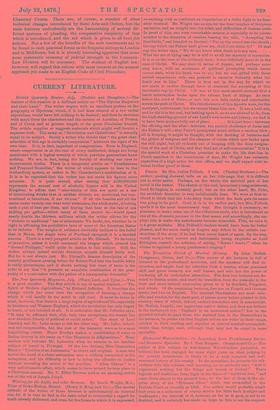CURRENT LITERATURE.
British Quarterly Review, July. (Hodder and Stoughton.)—The feature of this number is a brilliant article on "The Illyrian Emperors and their Land." The writer begins with an excellent preface on the geography of Myriam, which, if it had been cleared of a few verbal repetitions, would have left nothing to be desired; and then ho sketches with much force the characters and the careers of Aurelian, of Probus, and of Carus, and at greater length, of the great Diocletian himself, The article supplies or suggests materials which might well furnish a separate book. The essay on "Revolution and Catholicism " is scarcely equal to its subject. Surely a writer who thinks that " the great char- acteristic of this age is certainly compromise " misreads the signs of his own time. It is, in fact, impatient of compromises. Even in England, where compromise is at the root of every institution, things are being questioned with a logical severity of which previous generations knew nothing. We are, in fact, losing the faculty of abutting our eyes to inconvenient truths. There is a temperate article on " Drunkenness and Proposed Remedies," the writer of which appears to loan to the Gothenburg system, or rather to Mr. Chamberlain's modification of it. It is to be regretted that the writer has not made his figures more accurate. It is quite absurd, after stating that £180,000,000 represents the annual cost of alcoholic liquors sold in the United Kingdom, to affirm that " nine-tenths of this are spent on a use of intoxicating drinks that is neither dietetic nor medicinal, but con- ventional or luxurious, if not vicious." If all the females and all the males under twenty-one were total abstainers, the adult males, drinking each a pint of beer per diem, and buying that boor at the rate of one shilling per gallon—which many of them cannot do—would spend nearly double the thirteen millions which the writer allows for the "dietetic or medicinal " use of stimulants. We doubt, too, whether ho is right in affirming the prohibitive laws of some of the American States to be failures. The weight of evidence decidedly inclines to the belief that in Maine, the single town of Portland excepted, it is a decided success. There is a very pungent article on Mr. Disraeli. No fervency of invective, unless it could command the tongue which uttered the " Second Philippic," could quite do justice to this subject. Still, the writer, always indeed strictly decorous, acquits himself fairly well. But ho is not always just. Mr. Disraeli's famous description of the country gentlemen passing before Sir Robert Peel into the hostile lobby is really picturesque, and it shows nothing but want of taste in the critic to say that "it presents an exquisite combination of the pom- posity of a court-usher with the pathos of a transpontine dramatist."






























 Previous page
Previous page